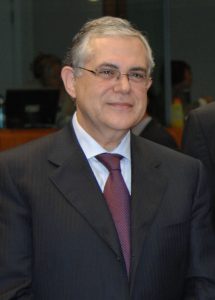
As one of the chief architects of Greek monetary policy during the 1990s, Lucas Papademos helped his country to stabilize the value of the drachma, win the confidence of international financial experts, and transition the Greek national currency to the euro. But with some European heads of state publically declaring that it was a “mistake” to allow Greece into the euro-zone, Papademos now finds himself having to win their confidence once again.
Papandemos, who has never held elected office, was named to be interim prime minister earlier this month. He has his work cut out for him: global confidence in the Greek government’s ability to meet its debt obligations is at a record low, driving the country’s 10-year-bond yield up from to a staggering 28.4 percent. If Greek debt continues to spiral out of control, the country will face bankruptcy within just a few weeks.
France and Germany have warned Greece that if it does not sign onto the bailout agreement reached in Brussels on Oct. 26 – which offers a massive debt write-down on the condition that the country implements painful new austerity measures – it will have its euro-zone membership revoked. (Papandemos’s predecessor, George Papandreou, very nearly sabotaged this deal when he called for a national referendum on the bailout package.) Yet before he can secure Greek’s participation, Papandemos will need to navigate a treacherous political landscape of bickering partisans and angry street protesters.
Papandemos, a Visiting Professor of Public Policy at the Harvard Kennedy School, is no stranger to economics and public policy. He holds a BS in Physics, a MS in electrical engineering, and a PhD in Economics all from the Massachusetts Institute of Technology, and he taught economics at Columbia University from 1975 to 1984 and at the University of Athens from 1988 to 1993. He also worked as an economist at the Federal Reserve Bank of Boston. His admirers say that he is a “skilled and thoughtful” technocrat whose distance from politics will prove an asset as he steers Greece through its fiscal crisis.
Some, however, doubt that Papandemos has the political chops to reach a far-reaching agreement. “He’s inexperienced on the political side,” said Tobias Blattner, a European economist at Daiwa Capital Markets, in an interview with Bloomberg News. “He’s really just a nice guy. In this situation where you need to push through draconian reforms, it requires a tough guy with political weight and skills.”
But the soft-spoken Papandemos seems to be up to the challenge. “I am not a politician but I have dedicated the biggest part of my career to economic policy in Europe and Greece,” he said upon his appointment earlier this month. “The Greek economy continues to face huge problems despite the very big efforts at fiscal adjustment and improvement of competitiveness… The way forward will not be easy but the problems can be solved, and will be solved, if there is unity, co-operation and consensus.”
On Nov. 18, Papandemos’s interim government unveiled its budget for fiscal year 2012. The plan, designed to regain the confidence of international creditors, will lower Greek’s budget deficit to 5.4 percent of Greek GDP (or 11.4 billion euros) from 9 percent this year (or 19.7 billion euros). As per the Brussels agreement, it slashes public pensions and wages in exchange for a debt swap that will bring down national interest rates. The budget goes to the Greek Parliament in early December, and will need to be approved there before Papandemos can secure the disbursement of bailout funds.
Under this budget plan, Greece’s debt as a proportion of GDP will fall to 145.5 from 161.7 percent in 2011. Gross domestic product will shrink again by an estimated 2.8 percent, after having contracted 5.5 percent in 2011.
The budget further predicts that national unemployment rates will average 17.1 percent in 2012, up from 15.4 percent in 2011. Inflation will average 0.6 percent next year, compared with 2.8 percent in 2011.
Papademos will not be teaching his spring semester course, “The Global Financial Crisis: Policy Responses and Challenges,” at the Kennedy School this year.
